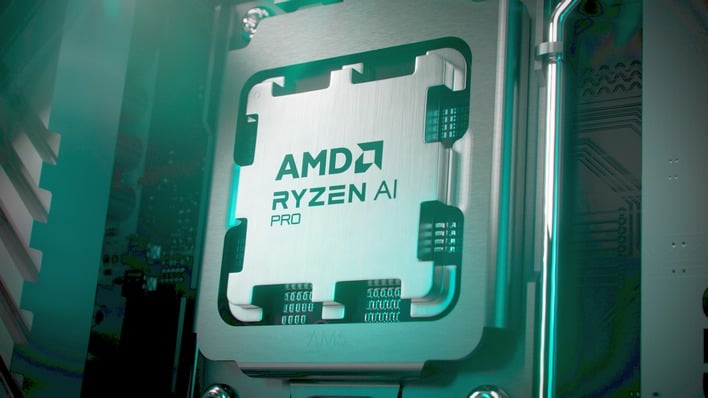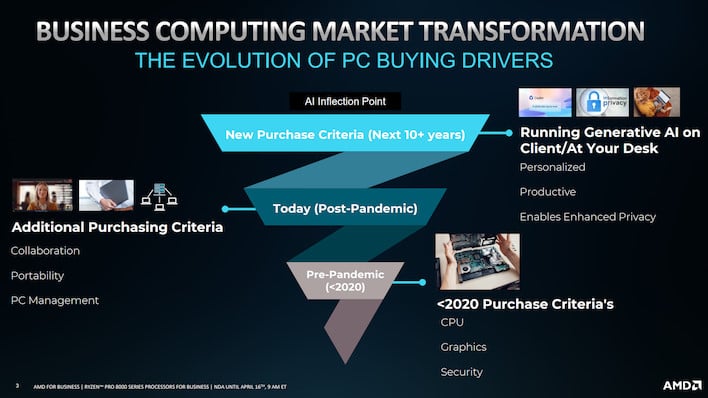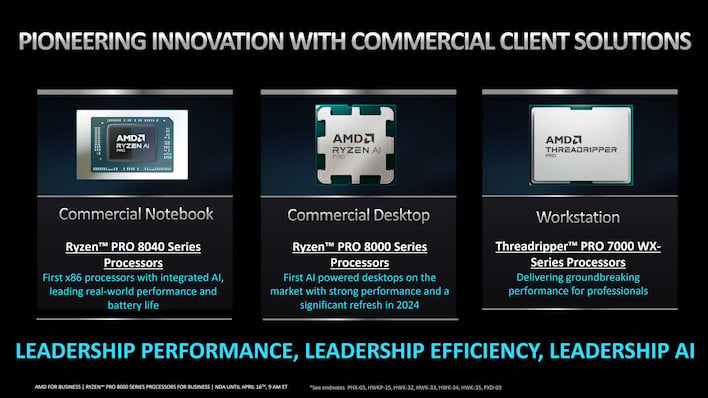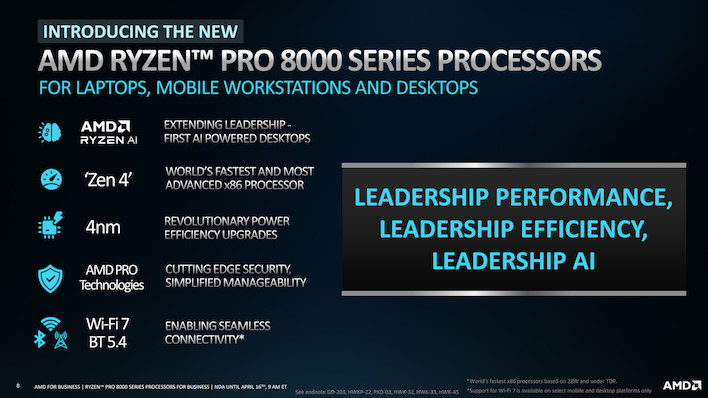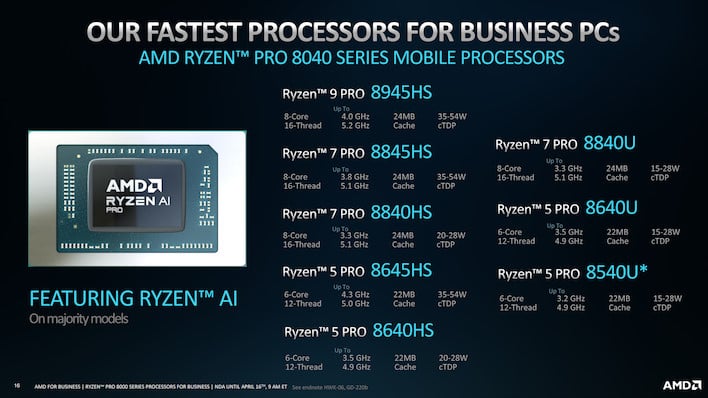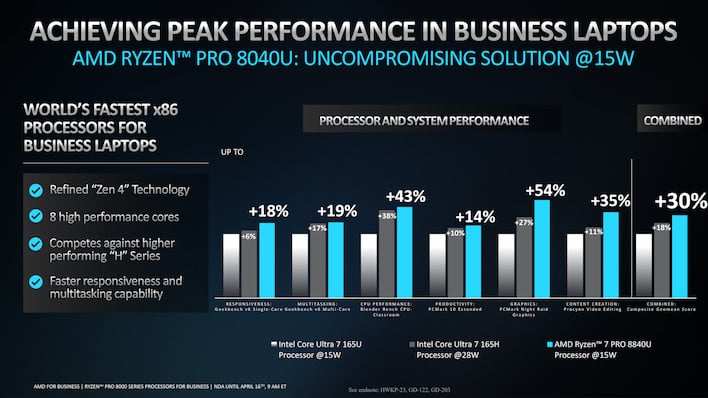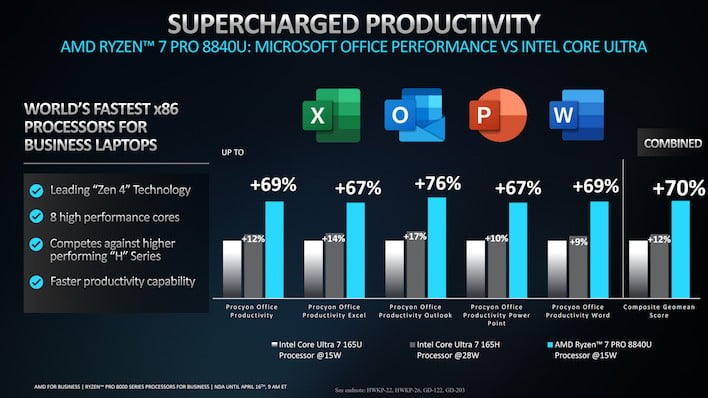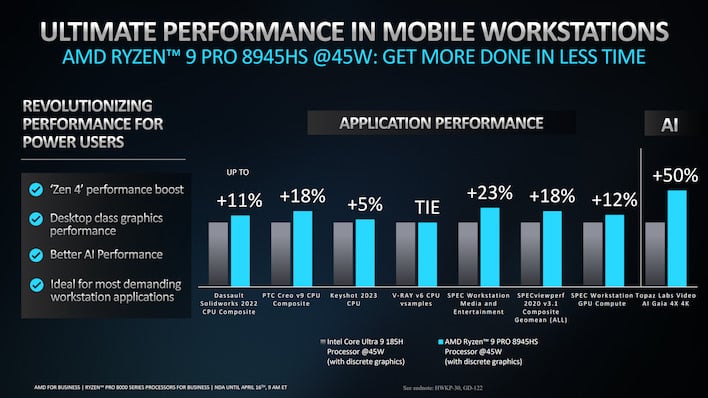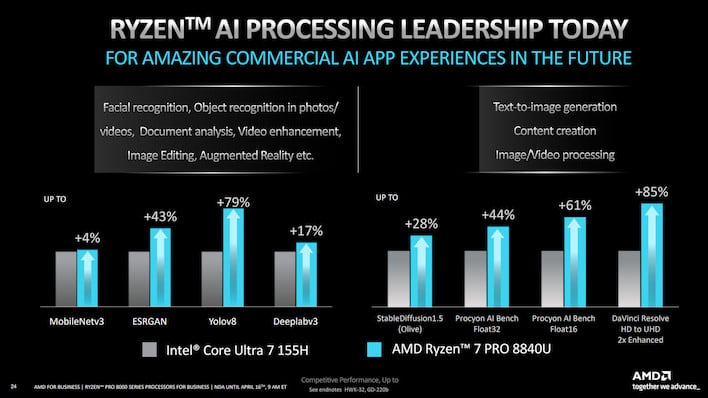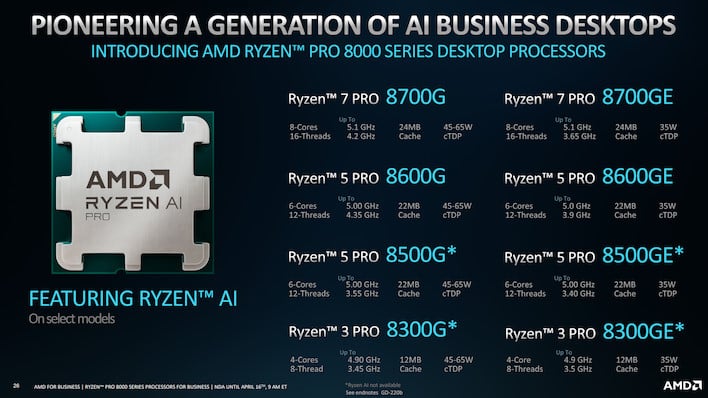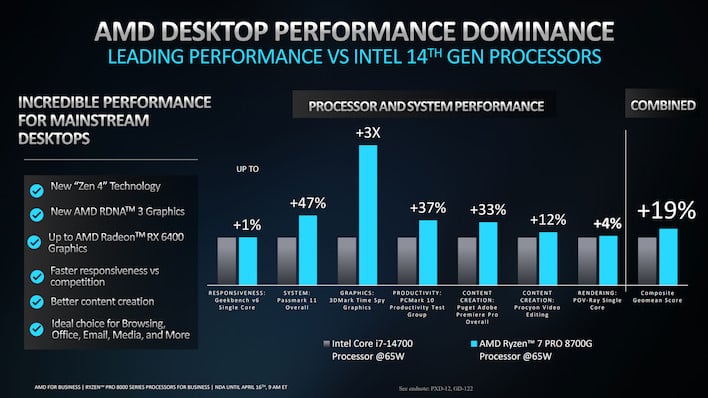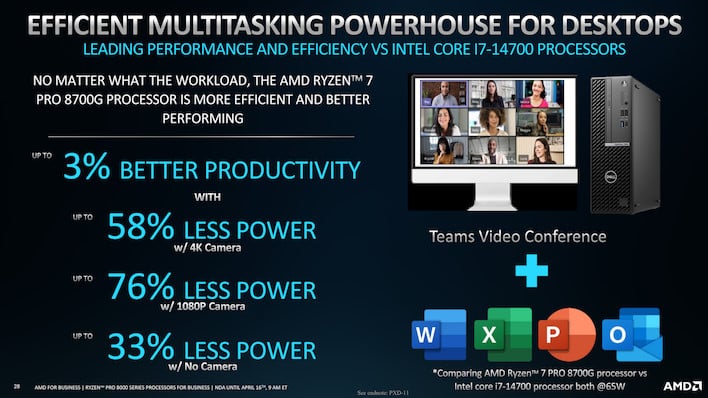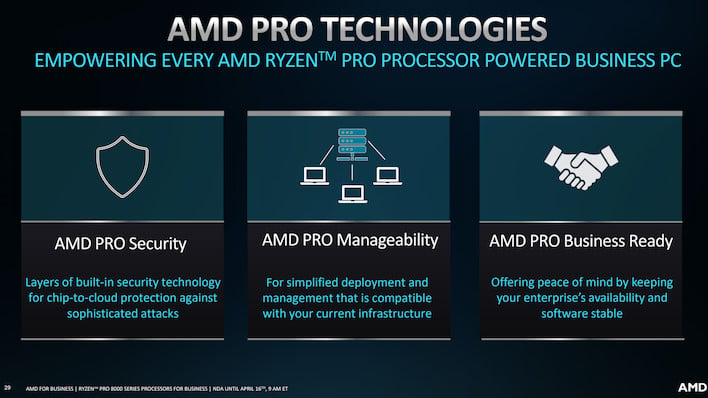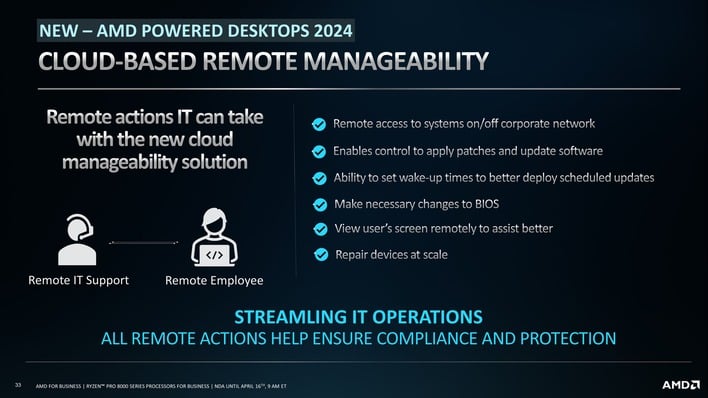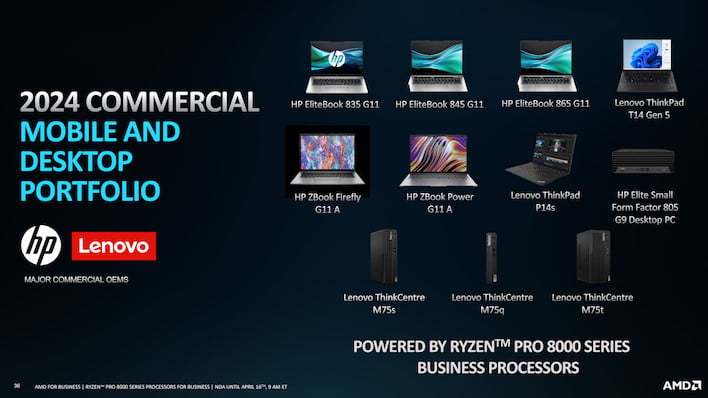AMD Ryzen PRO 8000 Processors Flex AI Muscle For Desktop And Mobile
There can't really be any doubt at this point: AI is going to change all of our lives, and there's no going back from here. Still, there's quite a bit of debate over exactly how it's going to happen. If you listen to hardware vendors like AMD and Intel, they'll tell you that you absolutely need to upgrade your business' computers to brand-new "AI PCs," or PCs with built-in AI acceleration. That's the goal of slides like this:
Whether you think generative AI is ready for prime time or not, there are plenty of salient arguments for the idea that it's worth upgrading to the latest hardware. Just like always, the newest chips are fabricated on the most recent process technology and feature the latest core architectures from each vendor. In the case of AMD, that means Zen 4 CPU cores, RDNA 3 graphics, and "XDNA" Ryzen AI neural processing units, or NPUs.
As of today, AMD has a three-pronged approach to client CPUs for business users. At the top end are the Threadripper Pro 7000-series processors that we've already checked out a couple of times before. For folks who don't need massive multi-core throughput, there are Ryzen PRO 8000-series desktop CPUs, and then for laptops we have the Ryzen PRO 8040 series mobile processors.
It doesn't take a genius to figure out that these parts are fundamentally the same hardware as the Ryzen 8000G desktop CPUs and Ryzen 8040 series mobile CPUs that both came out earlier this year. All of these parts are based on "Hawk Point" silicon, but the PRO versions of these processors do offer a few extra features over the standard models. We'll talk about those toward the end. First, let's take a look at these chips.
On the mobile side of things, we have parts ranging from the Ryzen 9 PRO 8945HS all the way down to the Ryzen 5 PRO 8540U. All of the HS parts with a model number ending in "45" have configurable TDPs between 35 and 54 watts, while the "40HS" parts range between 20 and 28 watts. Meanwhile, the "U" parts have the usual 15-28W TDP range. All of this is configurable by the system vendor, of course.
As the Hawk Point silicon only has eight CPU cores in a single CCX, there's not really that much to differentiate these parts. The Ryzen 5 PRO 8540U misses out on the Ryzen AI NPU, and it's likely that some of these parts have taken hits to the potency of their GPU hardware, but if so, AMD doesn't specify in its materials today.
However, AMD comes out strong in its comparisons against Intel for today's launches. On this slide, we see the Ryzen 7 PRO 8840U, configured for a 15W TDP, compared against Intel's Core Ultra 7 165U and 165H processors at 15W and 28W TDPs, respectively. At least by AMD's reckoning, its processor beats out the Intel chips by as much as 54% in this set of benchmarks despite the TDP advantage for Intel's part.
In this slide, AMD compares office productivity using the UL Procyon benchmark suite. This set of benchmarks uses your system's own native install of Microsoft Office applications to perform a variety of automated tests. If we trust AMD's numbers, its Ryzen 7 PRO 8840U at just 15W is supposedly 70% faster than Intel's Core Ultra 7 165H at 28W. We were impressed by the Core Ultra 7 165H in the MSI Prestige 16 AI EVO when we tested it, so that means these parts must be really quick—or the extra 16GB of RAM in AMD's test platform gives it a big advantage over the Intel platforms.
Comparing top-end laptop parts with discrete GPUs, AMD again claims performance leadership, this time against Intel's Core Ultra 9 185H. The gains here are smaller overall, although AMD highlights a 50% performance advantage against Intel's fastest Core Ultra CPU in Topaz Labs AI-powered video upscaling, which would be impressive if the AMD test platform didn't have a much larger discrete GPU inside than the Intel rig (per AMD's own test notes.)
On the desktop, we see a more varied selection of SKUs, fewer of which have Ryzen AI built in. These parts are once again fundamentally identical to the Ryzen 8000G desktop processors that AMD launched back in January, just with the Pro features enabled. The "E" models, as usual, see a reduction in base TDP, while the lower-end parts from both standard and "E" families lose the NPU.
AMD has less to say the performance of its Ryzen PRO 8000 desktop CPUs, but there are still some pretty interesting claims here. AMD says that its Ryzen 7 PRO 8700G at 65 watts is faster than Intel's Core i7-14700 with the same TDP across a pretty decent variety of productivity tests. The standout is of course the triple performance in the 3DMark Time Spy graphics test, but that's largely down to the fact that we're comparing a classical desktop CPU with minimal graphics against what is really a repurposed mobile processor that would once have been branded "APU." Still, the gains in the other apps are impressive, especially considering that we're comparing an eight-core CPU to a 20-core chip.
Another factor that makes the performance difference even more surprising is that the Ryzen 7 PRO 8700G draws less power than the Core i7-14700. AMD hammers on the power efficiency angle with these parts—although we do have to point out that remark in this slide: "no matter what the workload, the AMD Ryzen 7 PRO 8700G Processor is more efficient and better performing." That's a big claim from AMD, but the numbers it presents are compelling and we don't see any obvious "catches" in the provided test data.
If you're reading this and realistically considering an AMD Ryzen PRO purchase, you probably already know what that "PRO" badge entails, but just in case, let's talk about it a bit. AMD's PRO CPUs offer the same performance and efficiency as its standard Ryzen CPUs, just with some extra business-oriented features tacked on. That includes extra security features like AMD Shadow Stack and the Pluton security processor, remote management features like support for Windows Autopilot and cloud-based remote manageability, and a longer support cycle.
AMD specifically points out how its new cloud-based remote management features for its Ryzen PRO 8000G desktop CPUs can streamline your IT operations by allowing remote technicians to do nearly anything remotely that they could do with the machine at hand.
AMD is partnering with the usual suspects for this launch, that being HP and Lenovo. The company notes that all of the above hardware is coming soon, so you'll have your choice of mobile machines or micro-workstations with the new Hawk Point silicon sooner than later. Time will tell if the AI part of these Ryzen PRO 8000 processors ends up with real utility, but even if the NPUs were completely absent, you'd still be looking at extremely performant and efficient CPUs. That makes the Ryzen AI NPUs almost like a cherry on top of AMD's 2024 commercial CPU portfolio.

